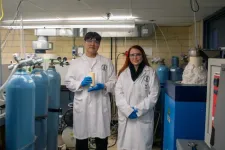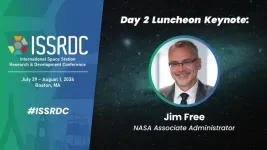(Press-News.org) As space travel becomes more common, it is important to consider the impacts of space flight and altered gravity on the human body. Led by Dr. Ana Diaz Artiles, researchers at Texas A&M University are studying some of those impacts, specifically effects on the eye.
Gravitational changes experienced by astronauts during space travel can cause fluids within the body to shift. This can cause changes to the cardiovascular system, including vessels in and around the eyes.
As the commercialization of space flight becomes more common and individual space travel increases, astronauts will not be the only ones experiencing these changes. Individuals traveling to space with commercial companies may not be as fit or healthy as astronauts, making it even more important to understand the role that fluid shift plays in cardiovascular and eye health.
“When we experience microgravity conditions, we see changes in the cardiovascular system because gravity is not pulling down all these fluids as it typically does on Earth when we are in an upright position,” said Diaz Artiles, an assistant professor in the Department of Aerospace Engineering and a Williams Brothers Construction Company Faculty Fellow. “When we're upright, a large part of our fluids are stored in our legs, but in microgravity we get a redistribution of fluids into the upper body.”
These fluid shifts may be related to a phenomenon known as Spaceflight Associated Neuro-ocular Syndrome (SANS), which can cause astronauts to experience changes in eye shape and other ocular symptoms, such as changes in ocular perfusion pressure (OPP). At this time, researchers are unsure of the exact cause of SANS, but Diaz Artiles hopes to shed light on the underlying mechanism behind it.
Diaz Artiles and her team are investigating potential countermeasures to help counteract the headward fluid shifts of SANS. In a recent study, they examined the potential aid of lower body negative pressure (LBNP) to combat SANS. This countermeasure has the potential to counteract the effects of microgravity by pooling fluid back into the lower body.
While the role of ocular perfusion pressure in the development of SANS remains undetermined, Diaz Artiles and her team hypothesized that microgravity exposure could lead to a slight but chronic elevation (compared to upright postures) in OPP, which may have a role in the development of SANS. The results of the recently published study showed that lower body negative pressure, while effective in inducing fluid shift toward the lower body, was not an effective method for reducing OPP. Should elevated ocular perfusion pressure be definitively linked to SANS, the use of LBNP could theoretically not be an effective countermeasure to this syndrome. But they emphasize that future work should seek to better understand the relationship between OPP and SANS, and the impact of LBNP on these ocular responses as part of the countermeasure development.
“This research is just one experiment of a three-part study to better understand the effects of fluid shift in the body and its relationship to SANS. Previous experiments in this study included the use of a tilt table for researchers to understand the cardiovascular effects of fluid shifts at different altered gravity levels, recreated by using different tilt angles,” said Diaz Artiles.
The published study, as well as upcoming research, focuses on countermeasures to the fluid shift; in this case, lower body negative pressure. In future studies, the researchers will examine the effects of using a centrifuge to combat the fluid shift and its effects. Diaz Artiles and her team aim to collect cardiovascular responses using each countermeasure and compare effects on ocular perfusion pressure and other cardiovascular functions that may be affected by microgravity environments. These studies are performed on Earth, so gravitational changes that occur in space may cause different outcomes. Thus, they hope to conduct future studies in true microgravity conditions, such as parabolic flights.
By Alyssa Schaechinger, Texas A&M University Engineering
###
END
Texas A&M researchers investigating the impacts of space travel on astronauts’ eye health
2024-06-19
ELSE PRESS RELEASES FROM THIS DATE:
UCSB's Haewon Jeong receives an NSF Early CAREER Award
2024-06-18
(Santa Barbara, Calif.) — Haewon Jeong, an assistant professor in UC Santa Barbara’s Electrical and Computer Engineering (ECE) Department, experienced a pivotal moment in her academic career when she was a postdoctoral fellow at Harvard University. She was investigating how machine learning (ML) models can discriminate against students in education-related applications. Discrimination, or bias, occurs when a model used to train algorithms makes incorrect predictions that systematically disadvantage a group of people. Bias in ML models can lead to inaccurate or unfair predictions, which can have serious consequences in fields such as healthcare, finance and criminal justice. ...
This new way to recycle steel could reduce the industry’s carbon footprint
2024-06-18
University of Toronto engineering researchers have designed a new way to recycle steel that has the potential to decarbonize a range of manufacturing industries and usher in a circular steel economy.
The method is outlined in a new paper published in Resources, Conservation & Recycling and co-authored by Jaesuk (Jay) Paeng, William Judge and Professor Gisele Azimi.
It introduces an innovative oxysulfide electrolyte for electrorefining, ...
Journal of Nutrition recognizes distinguished Texas A&M nutrition scientist
2024-06-18
MEDIA INQUIRES
WRITTEN BY
Laura Muntean
Paul Schattenberg
laura.muntean@ag.tamu.edu
paschattenberg@ag.tamu.edu
601-248-1891
210-859-5752
FOR ...
Non-native plants and animals expanding ranges 100 times faster than native species, finds new research led by UMass Amherst
2024-06-18
June 18, 2024
Non-native Plants and Animals Expanding Ranges 100 Times Faster than Native Species, Finds New Research Led by UMass Amherst
Native species cannot move fast enough on their own to avoid climate-driven chaos
AMHERST, Mass. – An international team of scientists has recently found that non-native species are expanding their ranges many orders of magnitude faster than native ones, in large part due to inadvertent human help. Even seemingly sedentary non-native plants are moving at three times the speed ...
NASA Associate Administrator Jim Free to deliver keynote address at ISSRDC
2024-06-18
BOSTON (MA), June 18, 2024 – Jim Free, associate administrator for NASA, will deliver a keynote address on Wednesday, July 31, at the International Space Station Research and Development Conference (ISSRDC) in Boston. Free, the senior advisor to Administrator Bill Nelson and Deputy Administrator Pam Melroy, is NASA’s third highest-ranking executive and its highest-ranking civil servant. In addition to leading the agency’s 10 center directors and the mission directorate associate administrators at NASA Headquarters ...
Cost may not keep many people from filling opioid addiction treatment prescriptions
2024-06-18
When people get a prescription for the opioid addiction medication called buprenorphine, they almost always fill it — even if they have to pay more out of their own pocket, a new study shows.
Whether it’s their first prescription for the medication, or they’ve been taking it for months, nearly all patients pick up the order from the pharmacy, according to the new findings from a University of Michigan team. Even among those just starting on buprenorphine, higher costs aren’t a deterrent.
The researchers say this suggests that removing barriers ...
Fred Hutch announces eight recipients of 2024 Dr. Eddie Méndez Scholar Award
2024-06-18
SEATTLE — June 18, 2024 — Fred Hutch Cancer Center announced the recipients of the 2024 Dr. Eddie Méndez Scholar Award, which recognizes outstanding early-career scientists from underrepresented backgrounds who are studying cancer, infectious diseases and basic sciences.
The eight postdoctoral awardees come from research institutions across the U.S. and are experts in a range of subjects including cancer immunology, fungal model systems and craniofacial development.
“We enthusiastically congratulate this year’s recipients who were chosen from a very competitive pool of candidates,” said Christina Termini, PhD, MM, co-director ...
NASA selects Lockheed Martin to build next-gen spacecraft for NOAA
2024-06-18
NASA, on behalf of the National Oceanic and Atmospheric Administration (NOAA), has selected Lockheed Martin Corp. of Littleton, Colorado, to build the spacecraft for NOAA’s Geostationary Extended Observations (GeoXO) satellite program.
This cost-plus-award-fee contract is valued at approximately $2.27 billion. It includes the development of three spacecraft as well as four options for additional spacecraft. The anticipated period of performance for this contract includes support for 10 years of on-orbit operations and five years of on-orbit storage, for a total of 15 years for each spacecraft. ...
C-Path partners with FARA to fortify RDCA-DAP and further accelerate drug development with new Friedreich’s Ataxia Data
2024-06-18
TUCSON, Ariz., June 18, 2024 — Critical Path Institute (C-Path), a leader in accelerating drug development for rare diseases, today announced the targeted integration of additional Friedreich’s ataxia (FA) datasets into C-Path’s Rare Disease Cures Accelerator-Data and Analytics Platform (RDCA-DAP®) as part of a partnership with Friedreich’s Ataxia Research Alliance (FARA).
This update includes data from two natural history studies; the FA-CHILD study, which focuses on pediatric ...
Rigorous new study debunks misconceptions about anemia, education
2024-06-18
In low- and middle-income countries, anemia reduction efforts are often touted as a way to improve educational outcomes and reduce poverty. A new study, co-authored by a global health economics expert from the University of Notre Dame, evaluates the relationship between anemia and school attendance in India, debunking earlier research that could have misguided policy interventions.
Santosh Kumar, associate professor of development and global health economics at Notre Dame’s Keough School of Global Affairs, is co-author of the study, published in Communications ...




